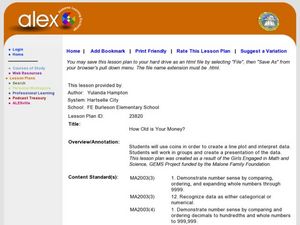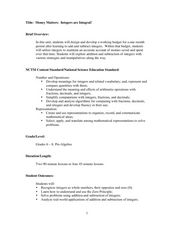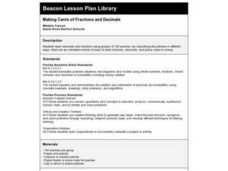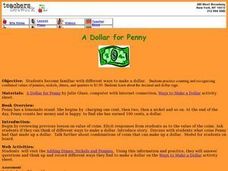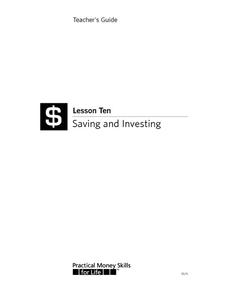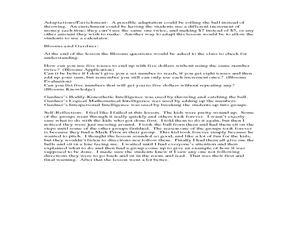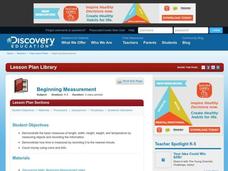Alabama Learning Exchange
How Old is Your Money?
Elementary learners explore coin mint dates. First, they listen to the book Alexander Who Used to be Rich Last Sunday by Judith Viorst. They then sort a collection of coins according to their mint date and put them in order from oldest...
Virginia Department of Education
Practical Problems Involving Decimals
After discussing decimals and "going shopping" in the classroom, young mathematicians are given four practical word problems that require them to estimate their answers, given specific information. The highlight of the lesson is having...
Curated OER
Double Your Money
What a creative way to delve into adding large numbers! After listening to a story called The King's Chessboard, learners estimate how much money they would have each day following instructions based on doubling and exponentially...
EngageNY
Informally Fitting a Line
Discover how trend lines can be useful in understanding relationships between variables with a lesson that covers how to informally fit a trend line to model a relationship given in a scatter plot. Scholars use the trend line to make...
Visa
Dream Big: Money and Goals
Whether their objective is independent living, going to college, or buying a car, pupils will participate in discussions and complete worksheets to gain an understanding of how short- and long-term goals play a large role in helping...
National Security Agency
Money Maters: Integers are Integral!
A thoroughly-written lesson plan and a plethora of worksheets about integers comprise this resource. Neophyte number crunchers learn to recognize integers, add and subtract them, and apply the concepts to the designing of a personal...
West Contra Costa Unified School District
Interest and the Number e
Mary, Mary, quite continuously, how does your money grow? Uses examples to examine the difference between simple interest and compound interest, and to take a look at different rates of compounding. Learners explore what would happen as...
Federal Reserve Bank
Creating a Budget
Learning to create and maintain a budget is an important life skill. Guide individuals in the discovery of their spending habits and how to track them. They then use what they learned to create a budget and make decisions on where they...
Curated OER
Making Cents of Fractions and Decimals
Students explore decimals and fractions using groups of 100 pennies. By classifying the pennies in different ways, there are an unlimited number of ways to learn fractions, decimals, and place value in money. This is a good, hands-on...
Curated OER
Data Analysis, Probability, and Discrete Math
Choose to supplement your probability unit with this resource and you won't be disappointed with the outcome. Teach young mathematicians to organize information using tree diagrams and lists in order to determine the possible outcomes of...
Albert Shanker Institute
Economic Causes of the March on Washington
Money can't buy happiness, but it can put food on the table and pay the bills. The first of a five-lesson unit teaches pupils about the unemployment rate in 1963 and its relationship with the March on Washington. They learn how to create...
Curated OER
Mental Money
Students access prior knowledge to round numbers and add decimals. In this mental math lesson, students share the book Betcha and calculate estimates for three jars based on the book. Students calculate money answers based on coins...
Curated OER
Right on the Money
Learners are introduced to coins and bills in American currency. After watching a video, they practice making the same amount of money out of different combinations of coins and bills. Using the internet, they discover how much each...
Curated OER
A Dollar for Penny
Students demonstrate different ways to make a dollar. In this consumer math lesson, students read the book A Dollar for Penny and identify the value of each coin. Students determine combinations of coins that can make up a dollar.
Curated OER
Money: Kids and Cash
Students discuss what a bank is and what it is used for. In this mathematics lesson, students solve problems related to interest and percentages.
Visa
Earning Money
Where does money come from? Is it limitless and always available? Introduce your youngsters to the concept of earning through jobs and/or chores with a matching activity and provided worksheets.
Visa
Saving and Investing
Impress upon your young adults the importance of saving and investing, and give them a foundational vocabulary from which they can continue to build their financial literacy. This lesson plan covers short- and long-term budget goals,...
Curated OER
Counting on Coins
Learners count coins. In this currency and mathematics lesson, students use skip counting to figure the value of a group of coins. Learners use plastic replica coins and real coins.
Curated OER
Money
Students count money using only coins. In this money lesson, students read Bennies Pennies, practice counting the pennies in the story and are then introduces to the different coins, penny, nickel, dime and quarter. Students use...
Curated OER
Mental Math for Adding Decimals
Fifth graders work in groups to practice adding decimals. In this adding decimals lesson, 5th graders call out different money amounts to each other and mentally add the coins called out. Students take turns calling out and adding the...
Curated OER
Money in the Bank
Pupils write and draw the pictures and words they see on each coin. They discuss the presidents or other images on the coins' faces. Students are told that each coin represents a specific amount of money. They trace their coins with...
Curated OER
How Do You Double Your Money?
Students understand how to calculate the return on investments for various rates and lengths. Also, they compare their results with the StocksQuest Calculator, which lists calculations year by year.
Curated OER
Discovering Math: Beginning Measurement
Young mathematicians are shown a ruler, yardstick, tape measure and scale. They practice measuring length, width, height, and weight. They are then shown a thermometer, and discuss what a thermometer is used for. Everyone is shown how to...
Curated OER
Cyber Currency, Currently
Students participate in online currency activities. In this currency lesson, students complete 6 activities which include online resources. They learn about bartering, monetary systems, foreign currency, stores, selling items, and finish...


